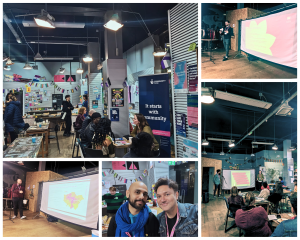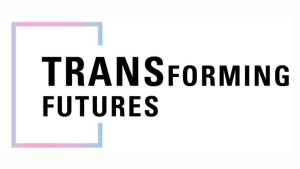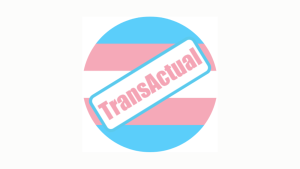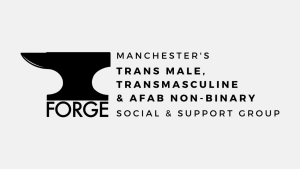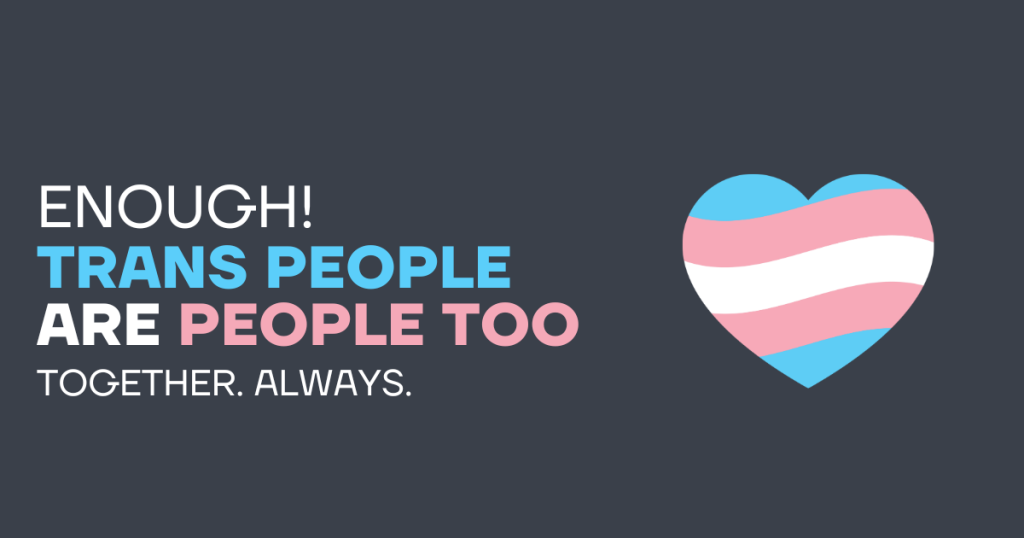Helmut De Nardi (they/he) – London Engagement Officer
A note on time
Pronouns, presentation, time.
A lifetime of wondering, ignoring or questioning feelings instead of thriving;
A child in the 80s- we did not have the pronouns then;
We didn’t have the kindness, the willingness to listen and learn.
The questions I had, the path not taken-
Where did it get me in the end?
Then One simple pump of transparent gel,
Then Two, then Three, then Four;
Enough to dissipate a lifetime of invisible waiting
To get to this moment, to walk my why.
To my fellow trans folx a gentle reminder:
Tis never too late to transition;
Tis never too late to become visible as your true self
‘This poem represents my unique and non-linear relationship with time, both in my experiences of gender and in my perception of ageing as a process of growth and manifestation, not of decline. I used to feel invisible, and now I am NOT. I hope it gives some trans joy to any siblings out there who may be wondering if their boat should have sailed long ago’.
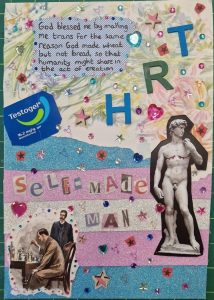
Damien Da Silva (he/him) – TRANSforming Futures Grants Officer
I made this collage for a LGBT+ History Month display put together by Rainbow Bedfordshire’s Craftivism group. In it I explore my experiences of medical transition, focusing on my personal experiences and relationship with myself and my body.
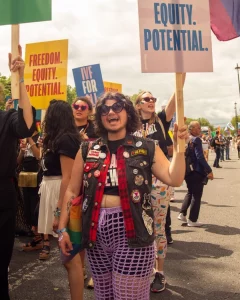
This photo is from when I marched with Stonewall at Pride in London. I crocheted the trousers and assembled the vest which includes my own embroidered patches alongside pins and such from other queer artists.
This post shows the vest in more detail, including tags to the artists of elements I didn’t create myself.
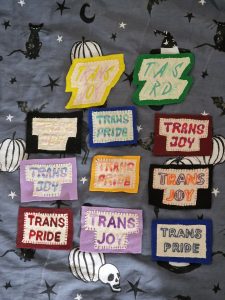
I made these patches for TransGiving. Transgiving is a not-for-profit project that sends free winter care packages to trans and non-binary people.
Art (used in the broadest sense of the word) is a powerful tool in the liberation of marginalised people. I feel as though these three different projects demonstrate some of the ways I use artistic mediums to explore my identity, connect with the trans community, and achieve visibility.
Ray Carter (they/them) – National LGBT+ Partnership Stakeholder Officer
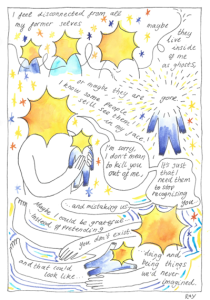
‘I have always had a complicated relationship with TDOV. I think, for many of us, visibility is complicated, dangerous, painful, vulnerable, and difficult. I know for myself, and a lot of my trans siblings, the joy and validation of being seen feels rare, far away or out of our reach. On TDOV, I often find myself asking; what’s the point of visibility without safety, without protection, without change?
However, I can’t underestimate how life-changing it has been to see people in whom I can see a part of myself and recognise ways to exist. When we, as trans people, see each other, possibilities become real. We create new ways of being.
For this TDOV, I’d like to recognise and appreciate all the trans people who can’t be visible, or for whom visibility is a constant struggle. I want to celebrate all the different levels of visibility that we inhabit.’
Mylo North (he/him) – LGBT+ Development Officer
‘My sense of visibility as a trans man is complicated. Early in life, I spent a long time wishing my transness was invisible, wanting to blend into ‘acceptable’ frames of gender – those created by a colonial, patriarchal society. I wished I could forget about my trans identity and my difference. Fear is a big factor; fear of being met with rejection, violence, isolation, ambivalence, confusion.
Now, further into transition, I’m more conflicted. Sometimes I feel able to be visible, sometimes I wish I could be more visible. Sometimes I still feel a need to hide. So much to do with visibility, and safety, is dependent on context, and on privilege. As a white trans man, I hold life-long and (with access to medical transition) new privileges.
When I think about visibility, one thing I’d like us to remember is that one of the biggest things we have in common as people is our difference – not just in our experiences of gender but in all multitudes of our lived experiences.’
Leo Kirkpatrick (he/they) – Communications Officer
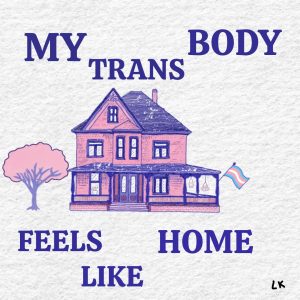
I like to explore the themes of my own trans visibility through the medium of art. Being able to interpret my thoughts and feelings about my transness through art has allowed me to explore my creative side and produce pieces that express the thoughts in my brain that are sometimes hard to put into words.
Since transitioning my trans body has started to feel more and more safe, a place to call home. Whenever you ask a person where they feel most comfortable and safe, the most obvious answer will be ‘my home’. It has taken me a long time and journey to be able to call my trans body ‘home’ but I am so happy that I feel this way.
I know Trans Day of Visibility can be a complex day for a lot of people, especially for those who cannot be visible or do not want to be for their own reasons and circumstances. Not only is this art a visualisation of how I feel within my trans body but also the feeling of being ‘at home’ in the trans and non-binary community. This art is also for those who may not have a safe space, who don’t have a place to call ‘home’ physically or emotionally, this art is an interpretation that the trans and non-binary community can be that home whenever you need it.

